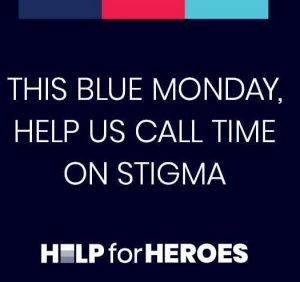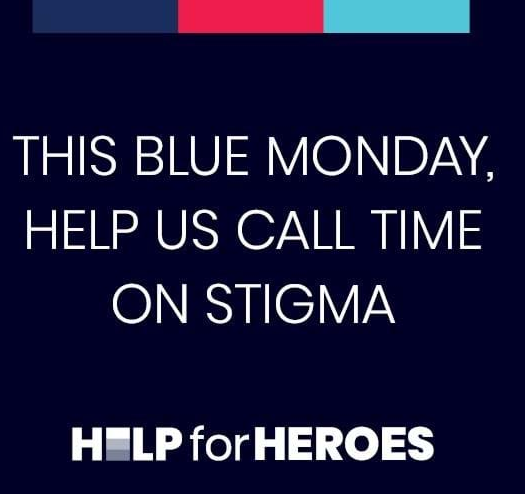
New survey results commissioned by Help for Heroes reveal that Armed Forces Veterans are delaying asking for help with their mental health (including PTSD) for almost four years partly due to believing civilian services will not understand or support them (28%) and a fear of being treated differently by friends (25%) and family (19%).
Monday 21st January, known as Blue Monday (the “most depressing” day of the year), will see the Stigma Clock projected onto the Tower of London in support of these Veterans, and a livestream of the launch at CutTheClock.com.
The Stigma Clock will be switched on by England Rugby World Cup winner and TV star, Matt Dawson, who has dealt with various difficult injuries during and after his sporting career.
One veteran who was affected by stigma is Mark Beckham. For nearly two decades, Mark battled to keep his mental health issues under wraps. Despite being deeply affected by the things he had witnessed whilst serving in Kosovo in 1999 with The Royal Anglian Regiment, it wasn’t until 2016 that Mark found himself at the end of his tether, barely able to function after spending years suffering a gradual decline in the way he felt:
“In the military you’ve got your pride and you don’t want to be seen as a weak individual. That’s why a lot of the guys don’t seek help – they don’t want to be seen as a weak link in the chain. It’s a difficult pill to swallow, to sit there and admit you’ve got something wrong. I found it very hard.”
“I am proud to stand up and call time on the stigma of mental health with Help for Heroes. For me 16 years of inner destruction passed before I had help. I wouldn’t want anyone else to suffer so long. I cannot thank the public enough for recognising this and getting behind it so Help for Heroes can continue their amazing work helping people like me.”
The projection is being shown across the capital this evening to highlight the 4-year wait, asking the public to share, donate or fundraise in support of wounded, injured and sick Veterans like Mark.
Joining Mark in speaking out about his mental health is Andrew Taylor. Andrew struggled to adapt to civilian life when an injury in Afghanistan ended his military career. Angry, frustrated and withdrawn, for four years he kept his feelings hidden until they almost boiled over.
In 2008, the Royal Army Medical Corps’ Veteran Andrew suffered serious back wounds when a suicide bomber detonated a device next to the vehicle he was in. Sent home for extensive treatment and rehabilitation, Andrew was medially discharged in 2013.
“I lost my sense of identity, my career, the friendships I’d made and the excitement that my job had given me. I felt that I’d gone from hero to zero.”
“For a long time, I thought I could fix myself. When those around me said I’d become withdrawn I didn’t listen. I just thought I was dealing with things my way.”
Things came to a head when Andrew had to stop himself confronting two strangers after overhearing their conversation.
Andrew admits that it took courage to ask for support, worried that it might be seen as a sign of weakness. Nonetheless, he made a phone call to Help for Heroes. Counselling sessions established that he was suffering from an adjustment disorder. His diagnosis meant that Andrew could finally start to make sense of the way he’d been feeling.
“I’d sat there deteriorating for 4 years thinking I could cope by myself and that I was the answer to this problem and I just had to figure it out. But it didn’t happen for me until I sought help and assistance.”
“Counselling has helped me to understand that I was going through a bereavement. Now, I’m in a much better place. Reaching out for help has changed me as a person. I’ve had to adjust some of my aspirations, but I’m getting there.
His message to anyone struggling is clear: “Make that decision to step forward and ask for help, because it is there.”
Karen Mead, Head of Psychological Wellbeing at Help for Heroes said: “Mark’s story is the reality for thousands of military personnel. Veterans are not accessing mental health support when they need it and we believe this needs to change. Our campaign is asking the nation to call time of stigma and to let those who have served their country know it’s ok to ask for help. We need the communities support to help us fund vital programmes to ensure we can continue to be there and respond quickly when Veterans do take that big step and ask for support.”
With every pound donated, every retweet, like or share on social media the public can help lessen the stigma and actively cut the time veterans are taking to seek help for psychological wounds. Help end mental health stigma at CutTheClock.com

